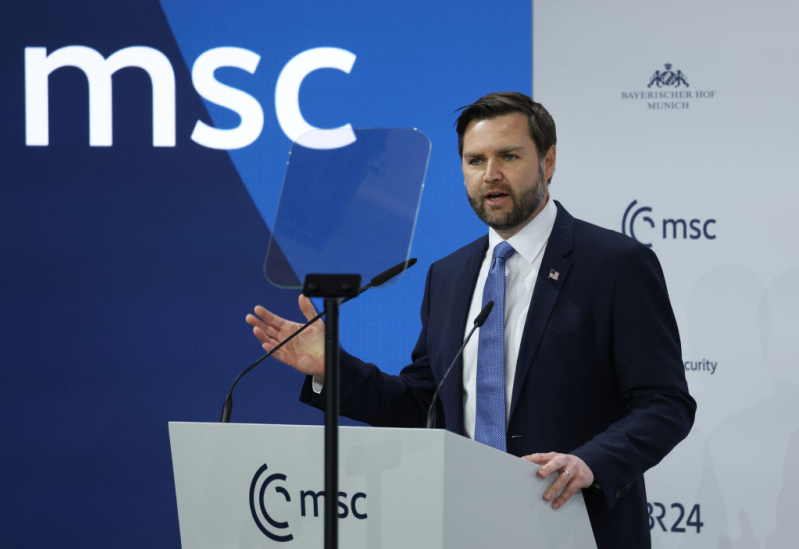
- US Vice President JD Vance’s Munich speech was marked by a frank critique of what he called the “status quo” of US-Europe relations.
- Trump 2.0’s policies, ranging from reciprocal tariffs to a rethinking of military commitments, have already signalled a shift away from the post-Cold War consensus on global leadership.
- JD Vance’s Munich address has emerged as a critical flashpoint in the ongoing debate over the future of US-Europe relations and NATO under Trump’s administration.
In a speech that sent shockwaves through transatlantic circles, JD Vance, a rising political figure in the United States, delivered a provocative address at the Security Conference in Munich. Under the banner of “America First,” his speech challenged longstanding assumptions about the cohesion of US-European alliances and the future of NATO. As Trump’s administration embarks on an assertive, unilateral foreign policy, Vance’s remarks have become emblematic of a broader ideological shift one that questions the durability of transatlantic ties in an era of rising nationalism and global power realignments.
Vance’s Munich speech was marked by a frank critique of what he called the “status quo” of US-Europe relations. He argued that Europe’s reliance on American security guarantees had bred complacency and a lack of self-reliance. According to Vance, the transatlantic alliance must be reformed to better reflect contemporary geopolitical realities, especially as American leadership pivots toward more transactional and unilateral policies under Trump’s second term. His rhetoric suggested that Europe should shoulder a greater share of its defence responsibilities, while the United States recalibrates its commitments in line with its “America First” doctrine. In doing so, Vance questioned the long-held belief that NATO and other transatlantic institutions would remain unassailable pillars of global order.
The implications of Vance’s speech are far-reaching. For one, his call for Europe to develop its strategic autonomy resonates with a growing contingent of European policymakers who have long been advocating for a more robust, independent European defence posture. This perspective is fueled by concerns over the reliability of US commitments, especially as Trump’s administration appears increasingly inclined to recalibrate its global obligations based on domestic priorities. Vance’s emphasis on self-reliance is likely to amplify debates within the European Union and NATO about burden-sharing and the future evolution of the alliance. Critics, however, warn that such rhetoric could exacerbate divisions and undermine collective security, particularly in the face of renewed challenges from Russia and China.
From a broader geopolitical lens, Vance’s Munich speech underscores a pivotal moment for transatlantic relations. The United States, under Trump’s leadership, has adopted a more confrontational posture toward multilateral institutions and traditional allies. His administration’s recent policies, ranging from reciprocal tariffs to a rethinking of military commitments, have already signalled a shift away from the post-Cold War consensus on global leadership. In this context, Vance’s call for a reformed alliance is both a reflection of internal American debates and a mirror of European anxieties. European leaders are increasingly aware that while they remain dependent on American military support, the shifting priorities in Washington may leave a strategic void that could be exploited by adversaries.
Moreover, the speech has reignited discussions on the very nature of the transatlantic alliance. Some analysts argue that Vance’s provocative stance might compel Europe to accelerate its defence initiatives, potentially leading to greater investment in Indigenous military capabilities and more assertive regional policies. Conversely, others caution that a too-rapid shift toward independence could fracture the cohesive framework that has underpinned decades of collective security and economic cooperation. The challenge for both sides is to balance the imperatives of national sovereignty with the undeniable benefits of close, institutionalised cooperation.
In conclusion, JD Vance’s Munich address has emerged as a critical flashpoint in the ongoing debate over the future of US-Europe relations and NATO under Trump’s administration. By questioning the existing model of transatlantic reliance and calling for a restructured alliance that better reflects current geopolitical realities, Vance has not only sparked intense controversy but also forced policymakers to confront the complexities of an evolving global order. Whether his vision will translate into concrete policy shifts remains to be seen, but one thing is clear: the era of unquestioned transatlantic solidarity is facing profound challenges in the 21st century.
References:
- Reuters. (2025, February 12). JD Vance’s provocative Munich speech raises questions about the future of transatlantic alliances.
- The Guardian. (2025, February 12). Trump’s “America First” policy and its implications for NATO and US-Europe relations.
- Politico. (2025, February 12). Inside the shift: How JD Vance’s Munich speech signals a new direction for US foreign policy.
- BBC News. (2025, February 13). Transatlantic alliances in the age of nationalism: Reassessing NATO’s role.
- The Wall Street Journal. (2025, February 12). US-European defense realignment: Trade, security, and the future of the alliance.
- Financial Times. (2025, February 12). Rethinking NATO: European leaders grapple with Trump’s recalibrated global strategy.
Shashank Pandey holds a Master’s degree in Diplomacy, Law, and Business from O.P. Jindal Global University. He currently works as a Policy Research and Strategic Consultant for the Office of the Deputy Chief Minister and Finance Minister of Manipur. Views expressed are the author’s own.
